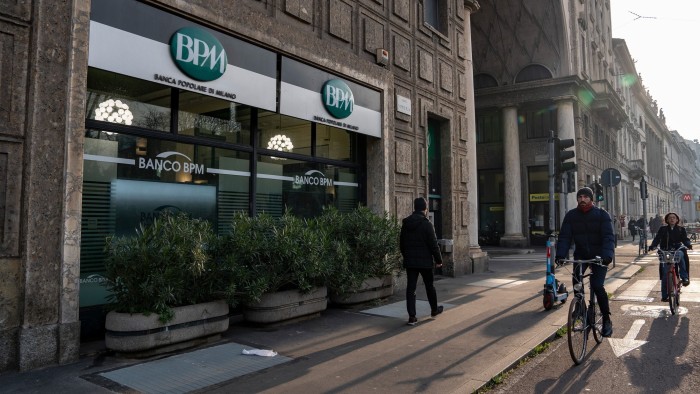Unlock the Editor’s Digest for free
Roula Khalaf, Editor of the FT, selects her favourite stories in this weekly newsletter.
UniCredit has said its bid for Banco BPM is in limbo after the Italian government imposed conditions on the transaction last week, further complicating chief executive Andrea Orcel’s dealmaking ambitions.
The lender said on Tuesday that it was “not in a position to take any conclusive decision on the way forward” regarding its €10bn bid for BPM after Prime Minister Giorgia Meloni’s government issued conditions on the deal under its so-called golden power rules.
UniCredit said the conditions included constraints on how the combined entity would run its future credit activities and liquidity, as well as restrictions on its right to dispose shareholdings and appropriately manage assets under management, and its activities in Russia.
The bank added that it had “promptly responded” to the Italian authorities and was awaiting feedback.
The decision by the Italian government, which comes as the country’s banking industry faces a wave of attempted consolidation, is the latest sign of pushback over UniCredit’s attempt to snap up its domestic rival and is likely to act as a stumbling block to the deal.
The Milanese lender led by Orcel surprised the market and Italy’s political establishment last November by making an unsolicited swoop for BPM only weeks after rapidly building a stake in Germany’s Commerzbank.
Meloni’s government was thrown by the move, which derailed its plan to create a larger national banking champion by merging BPM with Monte dei Paschi di Siena, which Italy is in the process of returning to private hands. The government said last week it would allow the bid for BPM to go forward, but only if UniCredit fulfils the conditions it has set.
The decision means that UniCredit’s dealmaking is stuck in limbo on two fronts amid political opposition, with Orcel reportedly saying last month that UniCredit could now wait until 2027 before deciding whether to make a bid for Commerzbank.
UniCredit said on Tuesday that Rome’s use of its golden power rules, which have rarely been used and were originally designed to block foreign takeovers of strategically important domestic assets, was “unusual”.
“The use of special powers in a domestic deal between two Italian banks is unusual, and it is not clear why it was invoked in relation to this transaction, but not on similar transactions currently under way in the Italian market,” UniCredit said in a statement on Tuesday.
“In addition, the conditions are open to different interpretations and could appear not fully aligned with Italian and EU law and with decisions pertaining to regulatory authorities.”
In recent years legislation governing Italy’s golden power rules has been extended to domestic takeovers of assets such as banks. But so far the government has never imposed similar restrictions on another national player.
Earlier this year, MPS launched a bid for its larger rival, Mediobanca, which the government has greenlighted to proceed without any conditions.
One senior banking executive in Milan said UniCredit’s presence in Russia could end up being a problem for the merged entity, after the European Central Bank demanded last year that the lender reduce its operations in the country.
Orcel told the Financial Times earlier this year that a breakthrough on the war in Ukraine could hasten the bank’s exit from Russia, adding that its commitment to leave the country was “absolutely clear”.
https://www.ft.com/content/7ed1b6d0-6e2d-4ee1-b766-10ba8a155231


